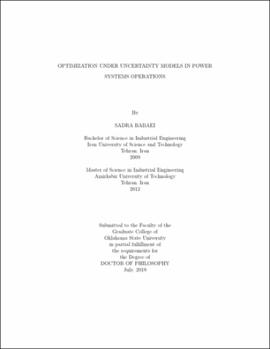| dc.contributor.advisor | Zhao, Chaoyue | |
| dc.contributor.author | Babaei, Sadra | |
| dc.date.accessioned | 2021-04-06T16:06:37Z | |
| dc.date.available | 2021-04-06T16:06:37Z | |
| dc.date.issued | 2019-07 | |
| dc.identifier.uri | https://hdl.handle.net/11244/329100 | |
| dc.description.abstract | Uncertainty is a critical issue in many power system problems. While distributed energy resources (DERs) like solar panels and wind turbines are exciting energy sources in meeting the nation's increasing energy demand, backing up the electricity grid in the event of outages, and peak shaving in the case of high demand charges, they also introduce new difficulties to the operation of power systems. One of the primary hurdles is the stochasticity of renewable energy generation caused by variations in day-to-day weather. If not properly addressed, this can lead to rolling blackouts and other detrimental outcomes in the grid. In addition, modern energy infrastructure is highly vulnerable to increasingly severe weather conditions. Because of inherently unpredictable weather conditions and intricacy of power systems, evaluating and mitigating the underlying risk of power system interruption are highly demanding for the system operators. This introduces new degrees of uncertainty that must be accounted for by power production facilities and system operators. | |
| dc.description.abstract | This study explores reformulations as well as approximation approaches to derive innovative decision-making under uncertainty models in the power system management. In particular, using techniques in Stochastic Programming, Robust Optimization, and Distributionally Robust Optimization, different uncertainty management schema are developed for protecting power grids from adversarial environments and accommodating renewable energy resources in the optimization of power system operations to provide resilient, reliable and cost-effective daily power generation scheduling. | |
| dc.description.abstract | More specifically, we begin with developing an incentive-based coordination mechanism between a wind energy supplier and a conventional energy supplier to hedge against the risks of electricity market price and wind power generation. Then, we address the energy management problem of a portfolio of DERs, a virtual power plant (VPP), to characterize and evaluate the standard attributes/parameters in the VPP's bid submitted to the energy market. Finally, we propose a data-driven model to assist the system operators to reduce the impacts of random component failures. In particular, a distributionally robust model is devised for designing a distribution power system to withstand the risk of disruptions imposed by natural disasters. | |
| dc.format | application/pdf | |
| dc.language | en_US | |
| dc.rights | Copyright is held by the author who has granted the Oklahoma State University Library the non-exclusive right to share this material in its institutional repository. Contact Digital Library Services at lib-dls@okstate.edu or 405-744-9161 for the permission policy on the use, reproduction or distribution of this material. | |
| dc.title | Optimization under uncertainty models in power systems operations | |
| dc.contributor.committeeMember | Buchanan, Austin | |
| dc.contributor.committeeMember | Yousefian, Farzad | |
| dc.contributor.committeeMember | Guo, Yuanxiong | |
| osu.filename | Babaei_okstate_0664D_16443.pdf | |
| osu.accesstype | Open Access | |
| dc.type.genre | Dissertation | |
| dc.type.material | Text | |
| dc.subject.keywords | data-driven optimization | |
| dc.subject.keywords | distributed energy resources | |
| dc.subject.keywords | electricity markets | |
| dc.subject.keywords | renewable energy | |
| dc.subject.keywords | robust optimization | |
| dc.subject.keywords | stochastic programming | |
| thesis.degree.discipline | Industrial Engineering and Management | |
| thesis.degree.grantor | Oklahoma State University | |
